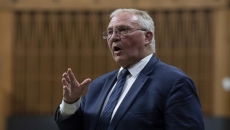British Columbians will have continued access to essential transportation as a result of a new grant to support inter-city bus service and medical evacuation needs through regional airports.
“While we can see light at the end of the tunnel, the pandemic is not over, and people and businesses still need help,” said Premier John Horgan. “Today’s announcement will help protect services people rely on to commute to important appointments safely and affordably – especially for those in rural and remote communities. This funding will help operators recover from this challenging time and build back even stronger.”
The Province is providing one-time funding of up to $10.7 million for inter-city bus operators and up to $16.5 million for regional airports to support operations between April 1, 2021, and March 31, 2022.
“During the pandemic, inter-city bus operators that connect rural and remote communities and regional airports that provide medical safety services experienced a significant drop in ridership,” said Rob Fleming, Minister of Transportation and Infrastructure. “This relief funding will help these vital services stay open and be ready for a strong recovery when travel restrictions are relieved by the COVID-19 vaccination effort in B.C.”
Inter-city bus operators help people, especially those living in rural communities, travel safely, affordably and efficiently for essential purposes. In the past year, the industry has experienced a significant decrease in ridership, affecting revenues. This funding will help companies maintain service over the next year and build back stronger as ridership returns.
“Today is filled with a sense of overwhelming gratitude and relief for the inter-city ground transportation sector across the province, but more importantly for the members of our rural, remote and Indigenous communities that rely on these services,” said John Wilson, president and CEO, Wilson’s Group of Companies. “With the announcement of this grant, I am pleased to say we will be looking at restarting services in the coming weeks to ensure Vancouver Island once again has the connectivity that so many members of our communities need.”
Airports have experienced a significant decrease in operating revenues that, without financial help, could affect their ability to support and sustain fire suppression and essential medical evacuation services. This grant will provide regional airports the necessary funds to maintain air terminals, runways and other operations for the essential movement of goods and people.
“Undeniably, aviation has been among the hardest hit sectors of the pandemic,” said Heather Bell, chair, BC Aviation Council (BCAC). “The BCAC applauds this announcement from the Province, and we see it as a clear sign that our government understands the vital role our airports play in our transportation system and provincial economy.”
This funding builds on additional financial support provided by the Province to the transportation sector. This includes reducing or waiving fees for passenger transportation licenses, including those in the taxi industry from April 2020 to June 1, 2021.
This is in addition to ensuring taxi companies can access and benefit from the Small and Medium Sized Business Recovery Grant Program. More than $1 billion in joint funding with the federal government will allow TransLink, BC Transit and BC Ferries to maintain essential transportation service levels throughout the province and help ensure fares remain affordable as part of BC’s Restart Plan.
“Ebus is pleased government recognizes the importance of inter-city travel for the residents of this great province,” said Dan Finely, vice-president, Motorcoach at Pacific Western Group of Companies. “The communities we serve receive vital access to essential education classes, health appointments and employment opportunities. Communities need these critical and safe transportation services as we deal with the pandemic and the far-reaching impact it is having on our society. We thank the Province for doing what it can to ensure the sustainability of critical access to services.”






